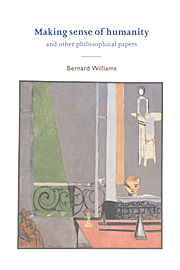Book contents
- Frontmatter
- Contents
- Preface
- I Action, freedom, responsibility
- II Philosophy, evolution, and the human sciences
- 7 Making sense of humanity
- 8 Evolutionary theory and epistemology
- 9 Evolution, ethics, and the representation problem
- 10 Formal structures and social reality
- 11 Formal and substantial individualism
- 12 Saint-Just's illusion
- III Ethics
- Index
12 - Saint-Just's illusion
Published online by Cambridge University Press: 28 January 2010
- Frontmatter
- Contents
- Preface
- I Action, freedom, responsibility
- II Philosophy, evolution, and the human sciences
- 7 Making sense of humanity
- 8 Evolutionary theory and epistemology
- 9 Evolution, ethics, and the representation problem
- 10 Formal structures and social reality
- 11 Formal and substantial individualism
- 12 Saint-Just's illusion
- III Ethics
- Index
Summary
In the first book that Marx and Engels wrote together, The Holy Family, there is a passage about the Jacobin leader Saint-Just, who was famous not only for his ruthless conduct of the Terror, but for the intensity with which he urged ideals of civic virtue drawn from the ancient world: his demand, as he expressed it, that revolutionary men should be Romans.
‘There is something tragic’, Marx and Engels wrote
in Saint-Just's illusion. On the day of his execution he saw hanging in the Hall of the Conciergerie the great tables of the Rights of Man, and with pride and self-esteem declared: ‘After all, it was I who did that.’ But those tables proclaimed the rights of a man who could no more be the man of ancient society, than his national–economic and industrial relationships could be those of antiquity.
My aim is to start out from Saint-Just's illusion, and by asking what made it an illusion, raise a question about the interpretation of ethical and political ideas, such as freedom, in different times and circumstances. This will lead us to consider a more extreme situation in which we have to interpret the life of other groups of human beings without sharing a history with them. That will lead us, finally, to some thoughts about moral philosophy and what it can do.
The idea which Marx and Engels put in that way, in terms of Saint-Just's illusion, had been expressed before, most notably by Benjamin Constant in his famous lecture twenty-five years earlier on ancient and modern liberty.
- Type
- Chapter
- Information
- Making Sense of HumanityAnd Other Philosophical Papers 1982–1993, pp. 135 - 150Publisher: Cambridge University PressPrint publication year: 1995
- 24
- Cited by



